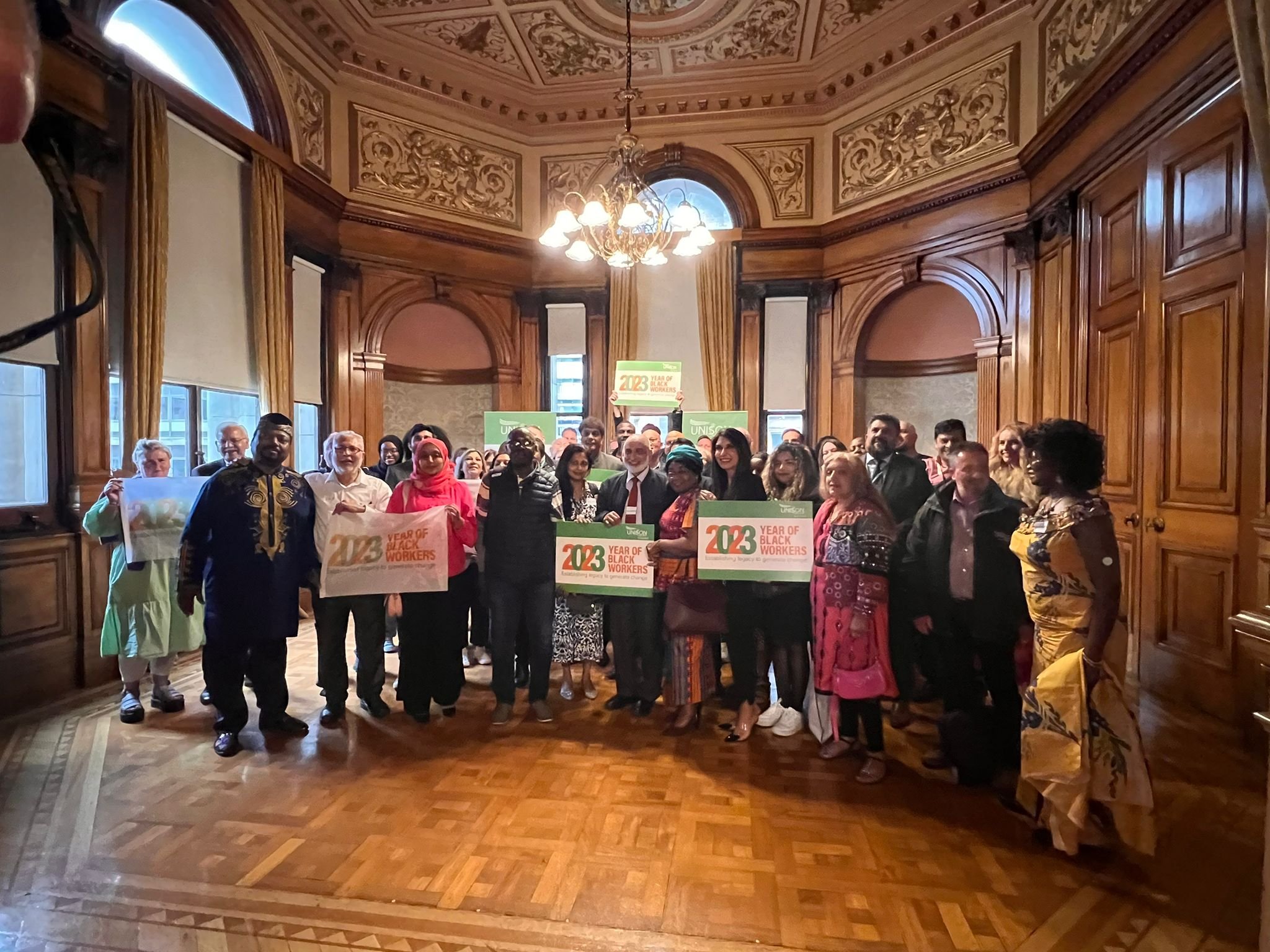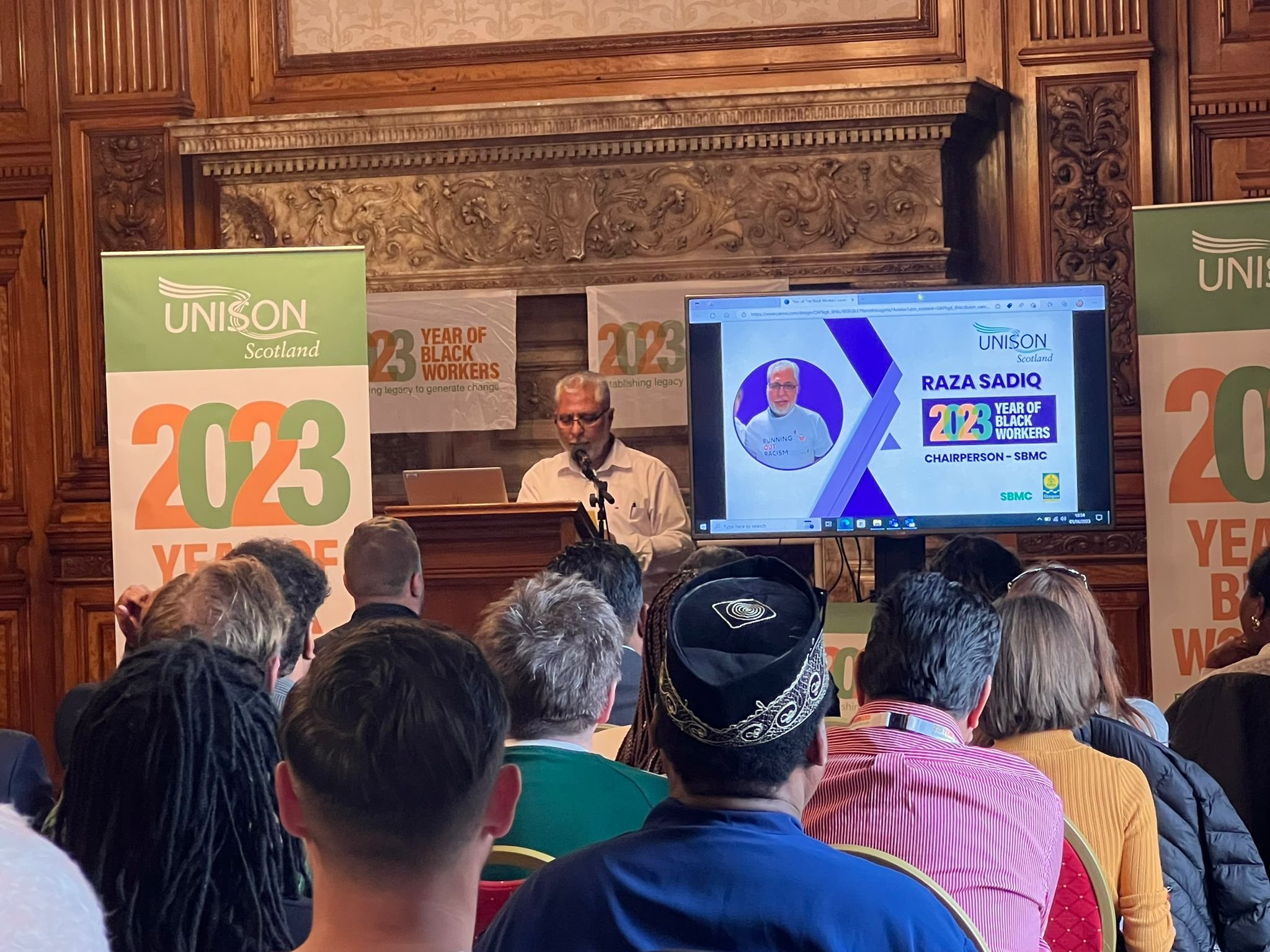BAME community leaders launch UNISON 2023 Year of Black Workers campaign
UNISON Scotland’s Black Workers Committee (SBMC) officially launched its campaign, 2023 Year of Black Workers, at Glasgow City Chambers on 1 June.
By Devon McCole | Photos by Devon McCole and Active Life Club
UNISON Scotland’s Black Workers Committee (SBMC) officially launched its campaign, 2023 Year of Black Workers, at Glasgow City Chambers on 1 June.
The event was hosted by Dr Soryia Siddique, Labour Councillor for the Southside Central ward which includes Govanhill and was presented by Kash Tannk, SBMC. Speeches were given b yRaza Sadiq, Chair SBMC, Kay McKerrell, Secretary SBMC, Zamard Zahid, Anti-Racist Campaigner, Paul Reddish, Volunteering Matters, Kaukab Stewart, MSP, Rohit Rao, PHD Researcher and Dr. Chinny Ireogbu, Vice Chair SBMC.
Each year, UNISON Scotland organises a themed annual campaign which focuses on tackling related issues. This year, the union will prioritise issues that affect black members, drawing attention to these issues, sharing experiences and working toward solutions.
Read more: Raza Sadiq of Active Life Club Wins Community Hero Award
Following the launch Raza Sadiq of Active Life Club, and chair of SBMC told Greater Govanhill: "There were many speakers and frank discussions on the barriers, inequalities and discrimination BAME communities still experienced.”
“It was clear after hearing our speakers that BAME communities want urgent action from legislators and policy shapers from all levels of government in order to actively eradicate racism and Islamophobia in all of its forms in society, including in the workplace.”
During his speech at the event, Raza stated that the UNISON campaign against racism is not about fixing individuals but about fixing the system.
Raza Sadiq at the campaign launch
He said: “We inherited a world that doesn’t work for everyone and Black, Asian and Ethnic minority workers are being asked to fit into workplaces rather than help change them.”
Other speakers at the event included MSP Kaukab Stewart, who was the first woman of colour to be voted into Holyrood, as well as researcher and educator Rohit Rao, and anti-racism campaigner Zamard Zahid.
Zahid read aloud statistics on racially charged hate crimes in Scotland, stating that on average a racist hate crime is reported three times a week.
She also noted that there have been incidents recorded in schools where children were asked to remove a Palestinian bracelet by teachers because of dress codes. For Zamard, education on Black history and racism in institutions is vital in the fight against racist attitudes and unconscious bias in schools and at work.
Another speaker, PhD researcher Rohit Rao, who has been investigating structural racism in schools and how this affects young minorities' work life and prospects, also discussed the impact of institutionalised racism.
Speaking at the event, he said: "the education system is working exactly as it was designed to do: to condition a segmented labour force in which certain groups of people do certain types of job, based on their 'race', class, and gender... To understand the branches of institutional racism in the workplace requires us to understand where it takes root: in our schools."
Like Rohit, many of the speakers called for open discussions in workplaces surrounding racism to help better people’s understanding of the problem and how to handle it.
Kaukab Stewart, SNP MSP for the Glasgow Kelvin constituency also shared the difficulties she faced as a woman of colour in the Scottish government and how important it is to continue breaking barriers.
She said: “I was elected as the first ever woman of colour in the Scottish Parliament. I was elected in 2021, but I tried before then in 1999. That was thirty-something years ago now, so it has been a long, hard journey with multiple barriers and some of those are only just starting to come down.”
She said: “The trade union movements have been at the forefront of fighting for an enormous amount of rights for lots of people - working class people, women, LGBTQ people, and for people of colour - so that everyone is on equal footing in the world of work.”
The Vice Chair of SBMC, Chinny Iroegbu, during the final speech of the evening said: “Race discrimination is a unique type of discrimination and it is severe. Race isn’t something you can change, it doesn’t go away and in every institution there exists an unconscious bias against those who are different or unlike ourselves.”
On the matter of unconscious bias, Secretary of SBMC, Kay McKerrell took to the stage again after Chinny and stated that if you are not consciously including someone you are likely unconsciously excluding them. Kay went on to say that far too often BAME communities are labelled as ‘hard to reach’ when really they are just easy to ignore.
The speakers who had come from all different sectors and working backgrounds, came together to share their experiences with racism in the workplace and what was very clear by the end of the evening is that the racism they experienced always extended far beyond the workplace.
It’s these institutions, our schools, our places of work and our government that UNISON, the SBMC and their speakers want to challenge throughout the year long campaign, to better suit a multicultural Scotland.
This article was edited on 12 June to reflect that Zamard Zahid was referring to a student being asked to remove a Palestinian bracelet rather than a headscarf. It was also edited to make clear that it was Dr Soryia Siddique, Labour Councillor for the Southside Central ward who hosted the event. It was further edited to to change an attributed quote from Rohit Rao.

